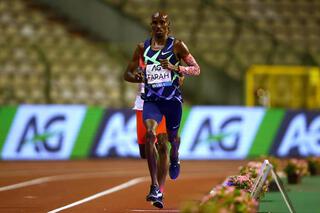Running news
07 September 2020, 1pm UTC
One hour track world records go in Brussels
Britain's Mo Farah and Sifan Hassan of the Netherlands set respective men’s and women’s world one-hour records at the Wanda Diamond League exhibition meeting at the King Baudouin Stadium in Brussels on 4 September.
Britain’s multiple world and Olympic champion held off the challenge of his training partner, home athlete Bashir Abdi, to set a new mark of 21,330m – eclipsing the 2007 mark of 21,285m set by Haile Gebrselassie. Abdi finished eight metres behind.
Hassan’s record also came after a titanic battle with Kenya’s world marathon record-holder Brigid Kosgei, although it later transpired the latter had been disqualified for stepping on to the infield in the closing stages.
The Dutch world 1500m and 10,000m champion reached 18,930 metres as the hour elapsed, beating the existing mark of 18,517 metres set by Ethiopia’s Dire Tune in 2008.
Moving into the final quarter of an hour, Tune’s mark seemed certain to be bettered, given that both women were more than a minute ahead of world record pace. The only question remained – which champion would secure it?
As they shadowed each other, swapping the lead but never getting away from each other, it was impossible to predict who would triumph. Hassan said afterwards that she thought Kosgei would “run away from her”.
But when the gun went to mark the final minute with the pair halfway down the back straight, Hassan moved ahead once more, and this time it was decisive.
Looking once behind her, the Dutch athlete took off, pumping her arms, going for broke. Kosgei, baring her teeth, did everything in her power to stay in touch, but there was no catching up, and when the 60 minutes elapsed, Hassan slowed to a halt halfway down the back straight after a crazy sprint finish.
“I didn’t feel good before the start of the race, I even puked,” revealed Hassan. “After 30 minutes of racing, I finally felt better. It was in the final 20 minutes that I gained the confidence I needed. When there were only two minutes left on the clock, the fun began. I just gave everything I had left. I am so happy with the win and the world record. It wasn’t easy.”
As the men’s race moved into the final quarter of an hour, the ghostly figure of the current world record holder, Gebrselassie, was shown in virtual shape, running at their side. They were bang on the pace.
With 10 minutes to go, they moved ahead of the world record schedule. They passed 18,000 metres in 50:43.
Inside the final five minutes, the home runner, who the day before had confessed that he expected Farah to beat him, moved to the lead, but the multiple champion was shadowing him still.
As advertised, the Wavelight visual pace-guidance system employing differently coloured LED lights installed on the inside edge of the track made the pursuit of records on the night immediately intelligible.
With three minutes remaining, both men were 30 metres clear of the leading blue lights, showing the intended pace, and the green lights snaking behind them, showing the actual world record pace.
A second world record appeared in the offing – and the same question was being asked. Who would break it?
The gun went to mark one minute to go, then Farah made a significant break. He charged around the bend as the final seconds ticked away, and at the same spot where Hassan had earlier triumphed, Farah did too, taking a few seconds to realise it was all over.
Abdi had the consolation of lowering the world best for 20,000m from 56:26 to 56:20.2, having led his friend through that mark.
“I was very excited to be back on the track,” said Farah. “it became tough so I was happy that Bashir took the lead, but I felt great with just one minute to go. A fast last lap is still my best tactic.”






